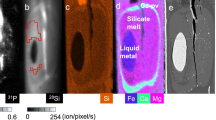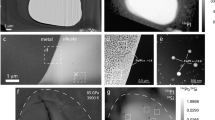Abstract
EXPERIMENTAL studies have so far suggested that an insignificant amount of neutral nickel (Nio) is soluble in silicate melts1–4. This has led to difficulties in explaining the high concentrations of nickel in the modern Earth's mantle, because virtually all nickel (along with other siderophile elements such as cobalt and the noble metals) would have been removed from the mantle when the Earth's metallic core separated from it at low oxygen fugacity1,2,5. Several models have been proposed to explain the Earth's siderophile element budget1,6–8, each based on the belief that the solubility of neutral metal species in silicate melts is negligible. Here, however, I present experimental evidence indicating that the solubility of at least one neutral siderophile element, nickel, is not negligible. Because the presence of Ni° will affect the partitioning of nickel between silicate melt and metal, and between silicate melt and crystalline silicate phases, these results have implications for our understanding of petrogenetic processes that take place in conditions of low oxygen fugacity, where Nio is an important part of total nickel. In particular, the Nio solubilities found in the present study are large enough to explain the anomalously high concentrations of nickel in the Earth's mantle if the temperature of the early mantle was sufficiently high (≳ 1,800°C).
This is a preview of subscription content, access via your institution
Access options
Subscribe to this journal
Receive 51 print issues and online access
$199.00 per year
only $3.90 per issue
Buy this article
- Purchase on Springer Link
- Instant access to full article PDF
Prices may be subject to local taxes which are calculated during checkout
Similar content being viewed by others
References
Jones, J. H. & Drake, M. J. Nature 322, 211–228 (1986).
Seifert, S., O'Neill, H. St C. & Grey, G. Geochim. cosmochim. Acta 52, 603–616 (1988).
Schmitt, W., Palme, H. & Wanke, H. Geochim. cosmochim. Acta 53, 173–185 (1989).
Dudson, P. J. & Fraser, D. G. in Progress in Experimental Petrology (ed. Ford, C. E.) 247–252 (NERC, 1981).
Ringwood, A. E. Origin of the Earth and Moon 1–38 (Springer, New York, 1979).
Newsom, H. E. & Sims, K. W. W. Science 252, 926–933 (1991).
O'Neill, H. St C. Geochim. cosmochim. Acta 55, 1159–1172 (1991).
Brett, R. Geochim. cosmochim. Acta 48, 1183–1188 (1984).
Semkow, K. W. & Haskin, L. A. Geochim. cosmochim. Acta 49, 1897–1908 (1985).
Colson, R. O., Haskin, L. A. & Keedy, C. R. Geochim. cosmochim. Acta 55, 2831–2838 (1991).
Rammensee, W. thesis, Univ. Mainz (1978).
Elliott, J. F., Gleiser, M. & Ramakrishna, V. Thermochemistry for Steelmaking Vols 1 & 2, 1–846 (Addison-Wesley, London, 1963).
Stevenson, D. J. in Origin of the Earth (eds Newsom, H. E. & Jones, J. H.) 231–249 (Oxford University Press, New York, 1990).
Jagoutz, E. et al. Proc. 10th Lunar planet. Sci. Conf. 2031–2050 (1979).
Ringwood, A. E. Moon 16, 389–423 (1977).
Wonks, W. B. & Melosh, H. J. in Origin of the Earth (eds Newsom, H. E. & Jones, J. H.) 151–174 (Oxford, New York, 1990).
Wanke, H., Dreibus, G. & Jagoutz, E. in Archean Geochemistry (eds Kroner, A., Hanson, G. N. & Goodwin, A. M.) 1–24 (Springer, New York, 1984).
Richardson, F. D. Physical Chemistry of Melts in Metallurgy Vols 1 & 2, 1–537 (Academic, New York, 1974).
Moddeman, W. E., Craven, S. M. & Kramer, D. P. J. Am. Ceram. Soc. 68, C298–C300 (1985).
Hashimoto, A. Geochim. J. 17, 111–145 (1983).
Morse, S. A., Rhodes, J. M. & Nolan, K. M. Geochim. cosmochim. Acta 55, 2373–2378 (1991).
Ehlers, K., Sisson, T. W., Recca, S. I. & Grove, T. L. Geochim. cosmochim. Acta (in the press).
Steele, A. M., Colson, R. O., Korotev, R. L. & Haskin, L. A. Geochim. cosmochim. Acta (in the press).
Hultgren, R., Desai, P. D., Hawkins, D. T., Gleiser, M. & Kelley, K. K. Selected Values of the Thermodynamic Properties of Binry Alloys (Am. Soc. for Metals, Metals Park, Ohio, 1972).
McKay, G., Wagstaff, J. & Yang, S. R. J. geophys. Res. 91, D229–D237 (1986).
Colson, R. O., Haskin, L. A. & Crane, D. Geochim. cosmochim. Acta 54, 3353–3367 (1990).
Campbell, I. H., Naldrett, A. J. & Roeder, P. L. Can. Mineral. 17, 495–505 (1979).
Colson, R. O. Proc. 22, lunar planet. Sci. Conf. 427–436 (1992).
Chart, T. G. High Temp. High Pressures 5, 241–252 (1973).
Author information
Authors and Affiliations
Rights and permissions
About this article
Cite this article
Colson, R. Solubility of neutral nickel in silicate melts and implications for the Earth's siderophile element budget. Nature 357, 65–68 (1992). https://doi.org/10.1038/357065a0
Received:
Accepted:
Issue Date:
DOI: https://doi.org/10.1038/357065a0
This article is cited by
Comments
By submitting a comment you agree to abide by our Terms and Community Guidelines. If you find something abusive or that does not comply with our terms or guidelines please flag it as inappropriate.



